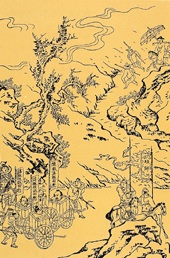Shui Hu Zhuan

An illustration of the novel
|
|
| Author | Shi Nai'an |
|---|---|
| Original title | 水滸傳 |
| Country | China |
| Language | Chinese |
| Genre | Historical fiction |
| Water Margin | |||||||||||||||||||||||

"Water Margin" in Traditional (top) and Simplified (bottom) Chinese characters
|
|||||||||||||||||||||||
| Traditional Chinese | 水滸傳 | ||||||||||||||||||||||
|---|---|---|---|---|---|---|---|---|---|---|---|---|---|---|---|---|---|---|---|---|---|---|---|
| Simplified Chinese | 水浒传 | ||||||||||||||||||||||
| Literal meaning | "Water Margin Story" | ||||||||||||||||||||||
|
|||||||||||||||||||||||
| Transcriptions | |
|---|---|
| Standard Mandarin | |
| Hanyu Pinyin | Shuǐ hǔ zhuàn |
| IPA | [ʂu̯èi̯ xù ʈʂu̯ân] |
| Wu | |
| Romanization | Sy去 vhu平 tsuae平 |
| Yue: Cantonese | |
| Yale Romanization | Séui wú jyuhn |
| Jyutping | Seoi2 wu2 zyun6 |
| Southern Min | |
| Hokkien POJ | Suí hóo tuān |
Water Margin is a novel attributed to Shi Nai'an. Considered one of the Four Great Classical Novels of Chinese literature, the novel is written in vernacular Chinese rather than Classical Chinese.
The story, set in the Song dynasty, tells of how a group of 108 outlaws gathers at Mount Liang (or Liangshan Marsh) to form a sizable army before they are eventually granted amnesty by the government and sent on campaigns to resist foreign invaders and suppress rebel forces. It has introduced to readers many of the best-known characters in Chinese literature, such as Wu Song, Lin Chong and Lu Zhishen.
Water Margin was based on the exploits of the outlaw Song Jiang and his 36 companions. The group was active in the Huainan region and surrendered to the Song government in 1121. They were recorded in the historical text History of Song. The name of "Song Jiang" also appeared in the biography of Emperor Huizong of Song, which stated:
The outlaw Song Jiang of Huainan and others attacked the army at Huaiyang, (the Emperor) sent generals to attack and arrest them. (The outlaws) infringed on east of the capital (Kaifeng), Hebei, and entered the boundaries of Chu (referring to present-day Hubei and Hunan) and Haizhou (covering parts of present-day Jiangsu). The prefect Zhang Shuye was ordered to pacify them.
Zhang Shuye's biography further described Song Jiang and the outlaws' activities and how they were eventually defeated by Zhang.
...
Wikipedia
